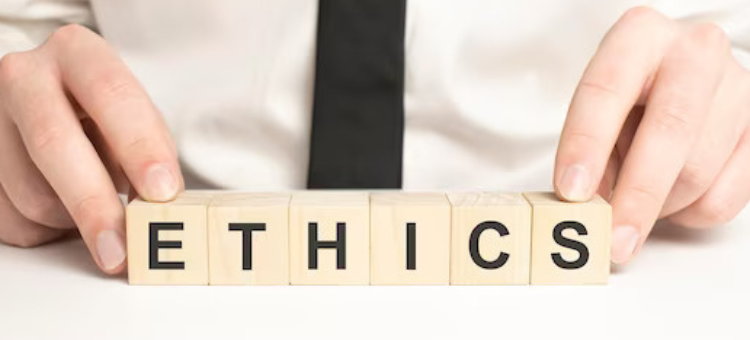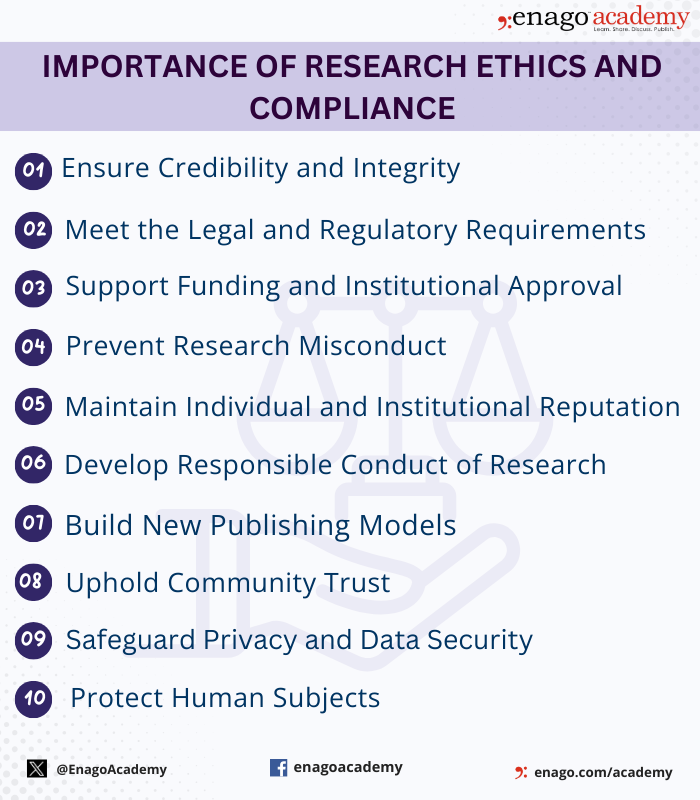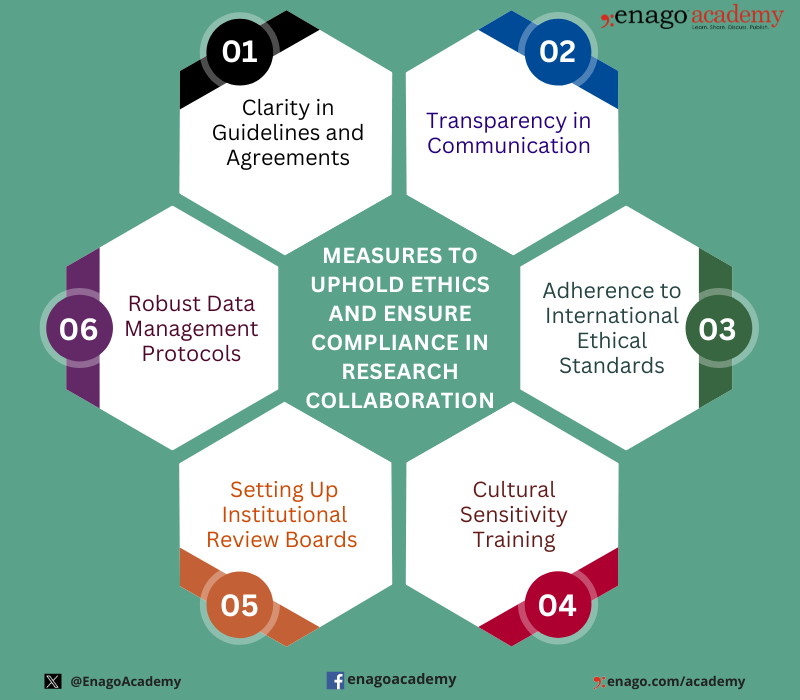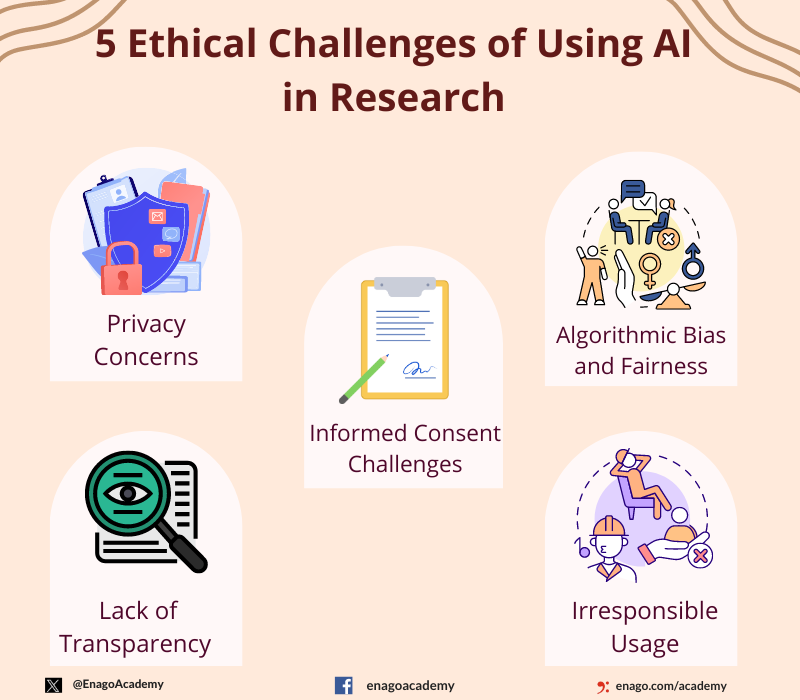Understanding the Difference Between Research Ethics and Compliance

Ethics refers to the principles, values, and moral guidelines that guide individual or group behavior to distinguish between right and wrong, and make decisions that align with moral standards. It often involves considerations of fairness, honesty, integrity, and respect for others. On the other hand, compliance is the act of adhering to rules, regulations, laws, policies, or standards. Compliance efforts are often designed to prevent violations of rules and regulations.
Importance of Research Ethics and Compliance
Research ethics and compliance is crucial for maintaining the trust of the public, fellow researchers, and institutions. A researcher’s commitment to ethical conduct enhances the credibility of their work, making it more likely to be accepted for publication and securing funding opportunities. Moreover, it prevents the potential legal pitfalls associated with unethical practices.

Research ethics and compliance are integral for conducting responsible, credible, and impactful research while safeguarding the rights and well-being of participants and maintaining the trust of stakeholders. Adhering to the ethical standards is indispensable in clinical research. Several ethical principles guide the conduct of clinical research, and adherence to these principles is essential to maintain trust, uphold integrity, and safeguard the interests of participants. Because participants play a crucial role by allowing testing of new drugs or treatments, ensuring awareness and adherence of ethical guidelines is pivotal to protect them and maintain scientific integrity.
Download this FREE content to know some ethical considerations in clinical research.
Ethics and compliance is imperative for international collaboration. However, with the increasing geopolitical tensions and rivalries, the importance of ethics and compliance in international collaboration in research cannot be overstated.
Ensuring Ethics and Compliance During Collaboration
Collaborative efforts are essential to pool resources, expertise, and perspectives to effectively tackle shared issues such as climate change, pandemic, etc. It enables the sharing of knowledge, data, and technological advancements, thereby creating a web of shared interests that can act as a stabilizing force amidst geopolitical tensions. However, ethics play a pivotal role in collaboration. Here are the three major roles of ethics in international collaboration are as follows:
1. Promoting Fairness and Equity:
Partnerships should not exploit one party for the benefit of another, and ethical guidelines help maintain a balance in resource distribution and credit attribution.
2. Respecting Cultural and Legal Differences:
Geopolitical tensions often arise from cultural and legal disparities between nations. This necessitates a deep respect for these differences, ensuring that the rights and values of all participating parties are upheld.
3. Safeguarding Data and Intellectual Property:
In collaboration involving the sharing of data and intellectual property, measure to protect sensitive information must be taken, and proper mechanisms to address issues related to intellectual property rights must be adopted to foster trust among collaborators.
Researchers must prioritize transparent communication, cultural sensitivity, and adherence to ethical guidelines to ensure a fruitful collaboration. However, the success of such collaborations hinges on the rigorous adherence to ethical principles. The following are some measures to be taken by the researchers to uphold ethics and ensure compliance in collaboration:

By proactively implementing these measures, researchers can contribute to the establishment of a strong ethical framework within international collaborations. Moreover, it promotes a culture of integrity and responsible conduct in the global scientific community. Apart from following ethical practices, researchers must be aware about the difference between ethics and compliance to ensure a complete understanding of the ethical principles.
Difference Between Ethics and Compliance
Ethics and compliance are related concepts, but they have distinct meanings and applications within various contexts, including business, research, and other professional fields. Here’s a breakdown of the key differences between ethics and compliance:
Characteristics |
Ethics |
Compliance |
Definition |
Ethics refers to the moral principles and values that guide individuals and groups in determining what is right or wrong. | Compliance refers to the act of conforming to rules, regulations, laws, or established standards to meet the requirements set by the authorities. |
Nature |
Ethics is considered more subjective and involves personal or organizational values. It reflects the internal moral compass that guides behavior based on principles. | Compliance is more objective and external in nature. It involves conforming to rules and regulations imposed by external entities or internal policies within an organization. |
Guidance |
Ethics is guided by principles such as honesty, integrity, fairness, and responsibility. Ethical behavior is often seen as a reflection of an individual’s or an organization’s commitment to doing what is morally right. | Compliance is guided by external rules and regulations, and adherence is often mandatory. Organizations and individuals are expected to comply with these rules to avoid legal consequences or penalties. |
Scope |
Ethics encompasses a broader spectrum of moral considerations and values that go beyond legal requirements. It addresses questions of right and wrong, fairness, and the impact of actions on individuals and society. | Compliance has a narrower focus on adhering to specific standards or regulations. It ensures that organizations and individuals operate within the bounds of the law, and violations may result in legal consequences. |
Enforcement |
Enforcement of ethical principles often relies on self-regulation, peer pressure, and internal values. While violations damage reputation, it may not always result in legal penalties. | Compliance is often enforced through regulatory bodies, audits, and legal mechanisms. Non-compliance can result in fines, legal actions, or other punitive measures. |
While ethics and compliance share the goal of guiding behavior and decision-making, they differ in their focus, nature, and scope. Organizations often seek to integrate both ethical principles and compliance measures to create a comprehensive framework for responsible and lawful conduct.
The intersection of ethics and compliance is a critical area within organizations, where ethical considerations and regulatory compliance overlap. While ethics and compliance are distinct concepts, they are closely related and often intertwined in the business and organizational context. Organizations are obligated to adhere to various laws and regulations that govern their operations. They often establish codes of conduct and policies to ensure compliance with laws, regulations, and industry standards. These policies provide guidelines for employees to follow in their day-to-day activities and address issues such as honesty, integrity, and respect, promoting a positive organizational culture. The emergence of AI has posed to be a potential threat to ethics as researchers are increasingly resorting to these tools due to lack of ethical awareness, resulting in misconduct and article retractions.
Challenges Associated With Using AI in Research
The growth of artificial intelligence (AI) has indeed introduced new challenges and considerations in the realm of research ethics. Here are some aspects to consider:

Ensuring compliance and ethics is of utmost importance with the advent of AI. Here are few tips to ensuring ethical compliance:
1. Develop Clear Ethical Guidelines
Establish comprehensive ethical guidelines that outline the expected standards of behavior. Ensure that these guidelines are communicated effectively to all stakeholders.
2. Promote a Culture of Ethics
Foster an organizational culture that values and prioritizes ethical behavior. This involves leadership commitment, employee training, and ongoing communication about the importance of ethics in all activities.
3. Implement Regular Training Programs
Conduct regular training sessions to educate employees about ethical standards, relevant laws, and industry regulations. This helps keep everyone informed and aware of their ethical responsibilities.
4. Encourage Whistleblowing
Create a safe and anonymous mechanism for employees to report ethical concerns or violations. Encouraging whistleblowing helps to identify and address potential issues early on.
5. Conduct Ethical Impact Assessments
Before implementing new policies, technologies, or research initiatives, conduct ethical impact assessments. Evaluate how these changes may affect stakeholders and identify potential ethical challenges.
6. Engage Stakeholders
Involve relevant stakeholders, including employees, customers, and communities, in the decision-making process. Understanding their perspectives and concerns can help shape ethical practices within the organization.
7. Regular Audits and Monitoring
Implement regular audits and monitoring processes to assess compliance with ethical standards. This proactive approach helps identify and address issues before they escalate.
8. Stay Informed and Adapt
Stay abreast of changes in laws, regulations, and ethical standards relevant to your industry. Adapt your ethical guidelines and practices accordingly to remain in compliance with evolving expectations.
9. Seek External Guidance
Consider seeking external advice from ethical experts, consultants, or industry associations. External perspectives can provide valuable insights and help ensure that your ethical practices align with broader societal expectations.
By incorporating these tips into organizational practices, one can work towards establishing and maintaining a strong ethical foundation, promoting compliance with ethical standards and regulatory requirements.
Ethics and compliance play a major role in building community trust towards science. Researchers must strive to follow good research practices and maintain ethical standards while conducting research. They should take care to stay updated of all the latest ethical guidelines set by regulatory bodies and should develop a strong culture of ethics to foster a healthy and strong future of research.
Frequently Asked Questions
Research ethics encompass a range of principles and practices aimed at ensuring the integrity and responsibility of scientific investigations. Some examples of research ethics include Informed Consent, Confidentiality and Privacy, Minimization of Harm, Data Management and Integrity, Respect for Diversity and Cultural Sensitivity and Compliance with Regulations and Guidelines.
Research ethics and compliance offer numerous benefits that contribute to the overall integrity and success of the scientific research process. Some benefits of research ethics and compliance are participant protection, increased credibility, publication and funding opportunities, legal and regulatory compliance and prevention of research misconduct.
Ethical behavior can be promoted by establishing clear ethical guidelines, providing training and education, implementing ethical review process, encouraging transparent reporting and promoting accountability.









